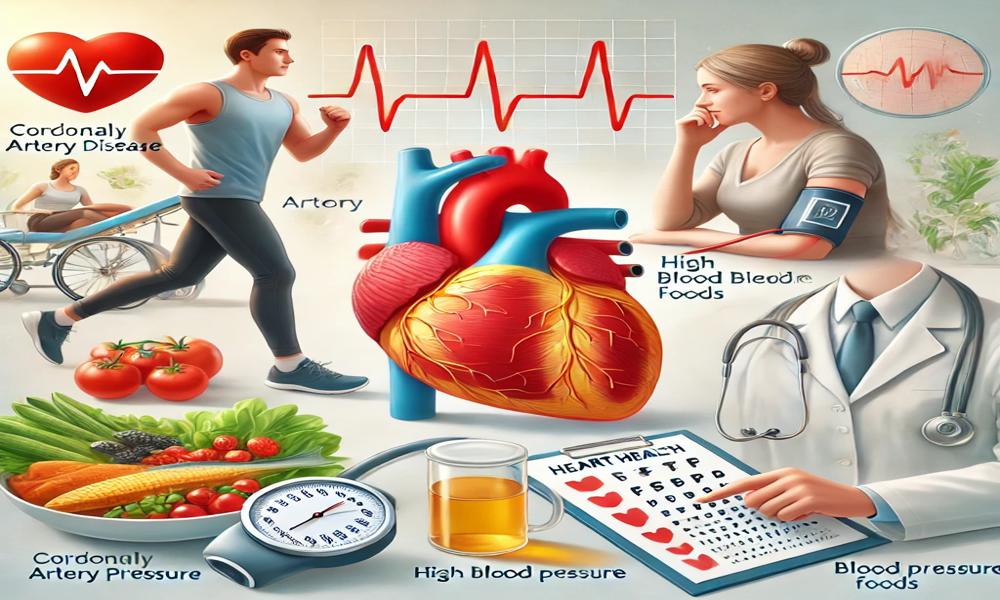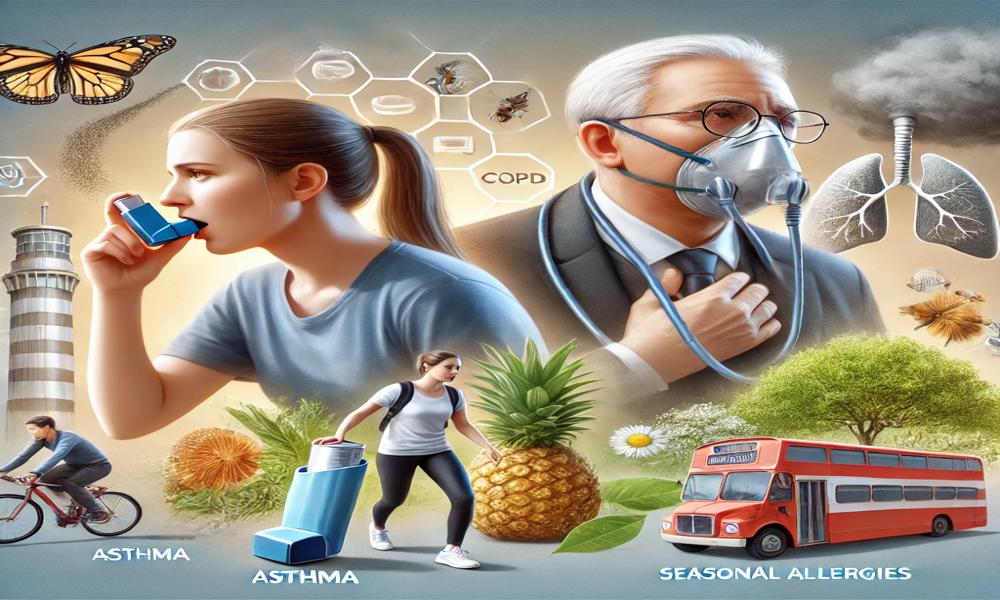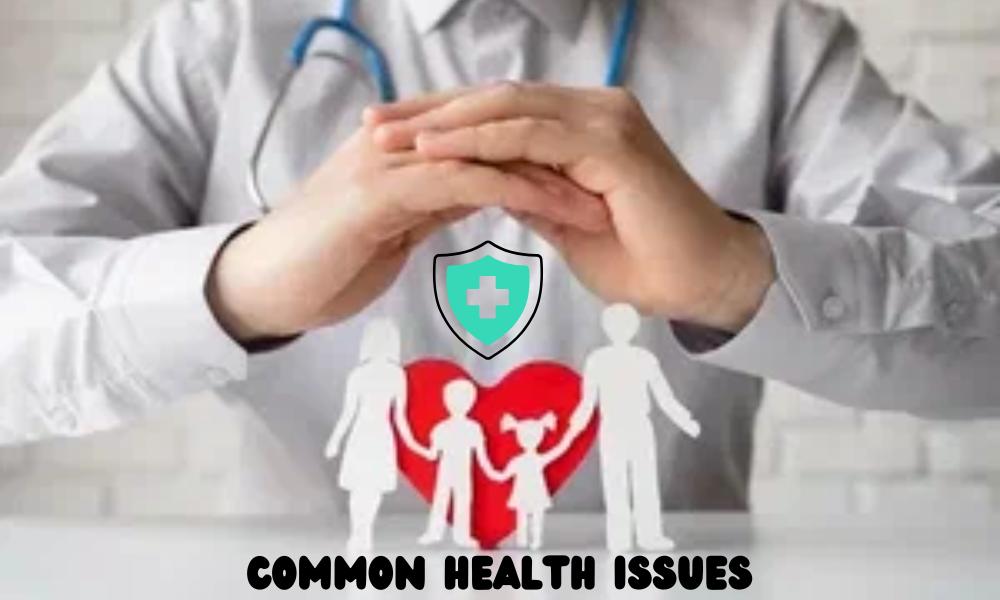Knowing common health issues is important to lead a healthy lifestyle and prevent the development of diseases. Common health conditions involve issues with major organs like the heart, brain, kidneys, and lungs, which are generally associated with lifestyle and environmental influences. It will discuss common health issues, prevention tips, and effective management strategies to be achieved in the long run.
Curious about common health issues? From heart and brain health to skin and mental wellness, discover essential tips to protect and enhance your well-being!
1. Heart Health Issues
Heart disease is the leading cause of death globally, affecting millions. Common health issues heart-related conditions include:
- Coronary Artery Disease: It is the disease in which blood vessels, which carry blood to the heart, are narrowed leading to chest pain or even heart attacks. It is mainly due to lifestyle issues such as eating a lot of fats, not engaging in enough exercises, and smoking.
- High Blood Pressure: Commonly known as the “silent killer,” high blood pressure is the most common major risk factor for stroke and heart attack and other heart conditions.
- Arrhythmias: If not treated, irregular heartbeats can lead to heart failure.
Prevention and Management
Exercise, a healthy diet, and refraining from smoking can be considered as a general approach to maintaining heart health. Foods rich in omega-3 fatty acids, fiber, and antioxidants have been known to contribute positively to cardiovascular health. A routine check-up on blood pressure and cholesterol can help diagnose problems early.

2. Brain Health Issues
The human brain is a key organ in the body, and preserving its health will facilitate the general welfare of individuals. The most common issues of the brain are:
- Alzheimer’s disease: It is a form of dementia that affects memory, thinking, and behavior. It usually appears during age and gradually increases with time.
- Stroke: Stroke Is the interruption of blood flow to the brain, which leads to cell death in the brain. Some of the signs and symptoms of stroke include sudden weakness, blurred vision, and confusion.
- Migraines and Headaches: This is a chronic form of migraines that can easily interfere with life activities because it can be painful, accompanied by sensitivity to light or sound.
Prevention and Management
This includes the mental activeness of a person combined with social activities and adherence to a diet rich in antioxidants such as fruits and vegetables; whole grains preserve healthy brains. Physical exercise results in enhanced blood flow, leading to reduced strokes among others. Mental common health issues is considered important in managing such headache disorders and migraines to help treat them with any appropriate medication.
3. Renal Health Problems
The kidneys filter wastes from the blood and help regulate fluids in the body. Common health issues with kidney health include:
- Chronic Kidney Disease: CKD normally results from diabetes or hypertension; thus, one loses renal function over time.
- Kidney Stone: This is the formation of hard mineral deposits in the kidney that can cause severe pain during urination.
- Kidney Infections: These are usually a result of an untoward bladder infection and must be treated immediately.
Prevention and Management
Remaining hydrated, using salt in minute quantities, and avoiding the excessive intake of protein avoids the damage of the kidney. Diabetes and hypertension patients should control these diseases since these diseases are precursors to kidney disease. Control of the condition of the kidney is achieved through periodic blood tests for patients affected by these medical conditions.
4. Respiratory Health Issues
A group of diseases affecting the lung and airways with effects on daily activities is termed respiratory health issues. This category includes respiratory problems during allergy seasons. These categories include:
Asthma
Asthma is a chronic disease that involves inflammation in the airways. The breathing becomes labored and can only be controlled by drugs.
COPD- Chronic Obstructive Pulmonary Disease
The common causes of COPD include smoking, emphysema, and chronic bronchitis. In all these cases, there is a reduction in airflow within the lungs.
Seasonal Allergies
The seasonal allergies are also known as hay fever. This occurs when one has pollen allergy, dust allergy, and animal dander allergy. It is accompanied by some symptoms like congestion, coughing, and breathing.
Prevention and Management
Avenging smoking, minimizing one’s exposure to air-pollutants, or use of masks in polluted places can be made easier. For allergies over the counter medications or allergic vaccines will provide relief. Good and steady exercise and breathing activity help in increasing lung-capacity and resistance against many other respiratory infections.

5. Digestive Health Conditions
The digestive system may involve the stomach, intestines etc. Lifestyle, food choices and stress can cause illness within this system. Typical issues that occur within it include:
- Gastroesophageal Reflux Disease: GERD enables the stomach acids to flow into the esophagus. There is heartburn.
- Irritable Bowel Syndrome: IBS refers to symptoms associated with the large intestine and includes bloating, gas, diarrhea, and constipation.
- Liver Disease: Diseases include hepatitis and fatty liver. Main issues are due to dysfunction, which often is seen in association with alcohol consumption, infections, and obesity.
Prevention and Management
Dietary measures that are rich in fiber, less fatty, and alcohol-free promote healthy digestion. For GERD, eating smaller meals and frequent intake, with avoidance of trigger foods like caffeine and spicy food, is a good preventive measure. Early detection through regular checkup by physicians can identify potential liver disease and possibly halt its advancement.
6. Bone and Joint Problems
Bone and joint diseases are also a common type, which could be problematic to people of all ages. The disorders include the following:
- Osteoporosis: This disease causes bones to weaken, making them more susceptible to fractures.
- Arthritis: Inflammatory conditions, such as osteoarthritis and rheumatoid arthritis, cause joint pain, stiffness, and swelling.
- Back Pain: Most commonly associated with posture, lifestyle, and spinal problems, it can severely limit a person’s daily activities.
Prevention and Management
A diet rich in calcium and vitamin D, exercise to build bones, and maintaining a healthy weight are all thought to contribute to good bone health. Muscle and joint strength can be developed through regular strength training. Low-impact exercise like swimming is appropriate for someone with arthritis, in conjunction with medication when required.
7. Skin and Hair Common Health Issues
Skin and hair health is usually a good indicator of general health. Some common health issues include:
- Eczema: It is an inflammatory skin condition, characterized by itchy and dry patches. It may be caused by allergens or stress.
- Psoriasis: This is a chronic autoimmune disease, which leads to rapid buildup of skin cells. Scaling and red patches occur.
- Hair Loss: Hair thinning may be caused by genetics, stress, hormonal imbalances, or dietary deficiencies.
Prevention and Management
Keeping the skin moist, using sunscreen, and avoiding allergens will be able to help in eczema and psoriasis. A balanced diet that contains vitamins and minerals improves hair health. Visit a dermatologist if skin issues are not improving with home care.
8. Eye Health Issues
Vision plays a huge role in one’s life, yet so many neglect eye care. Eyes Common health issues are:
- Cataracts: This is the condition that involves the clouding of the eye lens, resulting in blurry vision, especially common among the elderly.
- Glaucoma: An increase in intraocular pressure that may damage the optic nerve and lead to permanent vision loss.
- Macular Degeneration: It is usually age-related and impairs the central vision, making objects difficult to read.
Prevention and Management
A diet rich in vitamins A, C, and E, regular eye exams, and wearing sunglasses help preserve eye health. Reducing screen time and giving your eyes a break can prevent strain.
9. Mental Health Issues
Mental health is as important as physical health. Mental common health problems fall under these headings:
- Anxiety and Depression: Anxiety and depression often co-occur, so mood, energy, and functioning change.
- Bipolar Disorder: The disorder features mood shifts to extremes; manic highs occur interspersed with depressive lows.
- Obsessive-Compulsive Disorder: OCD results in the tendency of an individual to perform certain compulsive behaviors to counteract obsessions.
Prevention and Management
Exercise, physical activity, stress management techniques, and counseling can effectively support mental health and other common health issues. Sometimes, the symptoms require pharmacological interventions and therapy for proper management. In certain cases, treatments like Dermal Fillers can also help address health-related aesthetic concerns, promoting both physical and emotional well-being.
Conclusion
A holistic approach to maintaining good health, and preventing and managing common conditions affecting different organs and body systems, is the only way. A healthy lifestyle with proper nutrition, regular exercise, and regular screening can go a long way in preventing most of them. Consultation with doctors is always required to assess risk factors, preventive measures, and treatment options based on specific common health issues, and the pursuit of well-being today means a better future.




Pingback: Healthtdy.xyz: Nutrition Secrets for Optimal Well-being - INKWEllINFO.IN